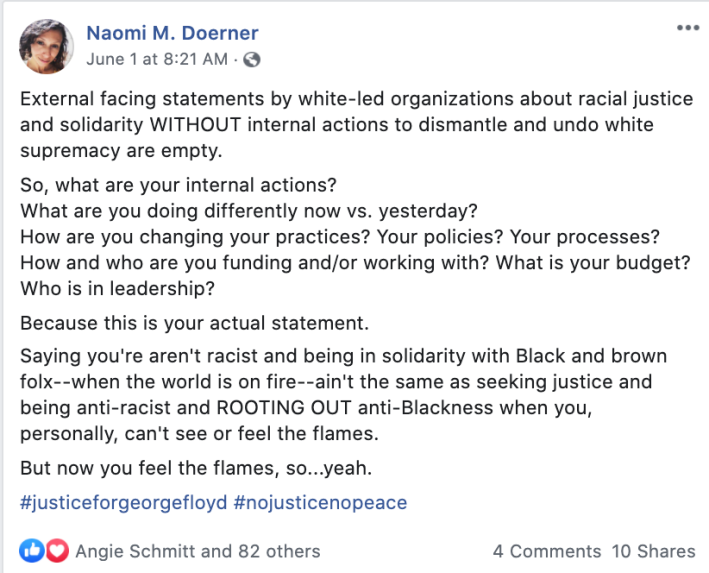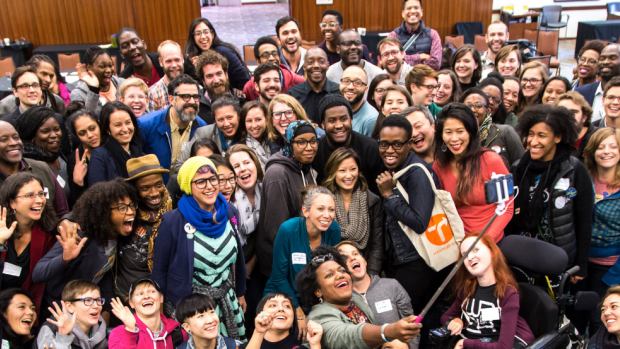People of color in the transportation industry are calling on their white counterparts to make concrete, public commitments to confront their history of racism and join BIPOC in building an antiracist transportation landscape — and shared many resources authored by their fellow PoC leaders to help them do that vital work.
Here's Tamika Butler, who is the director of equity and inclusion as well as the director of planning for California at Toole Design, sharing wisdom for organizations whose recent solidarity statements rang hollow. (Leaders outside the transportation space should listen to this message, too.)
Making a statement isn't a statement. It's the least you can do. Make the statement. Include what you're actually going to do as a company. Include some concrete actions that cannot fall to POCs. This will involve change & those in power letting some of it go. Then do something.
— tamika butler is @tamikabutler@mastodon.social (@TamikaButler) June 1, 2020
And stop being afraid of saying Black. If you're not ready for this kind of change and a statement really seems like all you can manage, then get out of the way for those who are ready to lead.
— tamika butler is @tamikabutler@mastodon.social (@TamikaButler) June 1, 2020
Naomi Doerner, a core organizer of mobility-justice collective The Untokening, also challenged organizations to ask themselves a deeper set of questions in this public facebook post.

Keith Benjamin, director of the Charleston, S.C., Department of Transportation, gave white leaders an enormous gift: a playbook of resources authored primarily by people of color to help apply an antiracist lens to their work. Here's the start of the thread to whet your appetite, but we recommend clicking through and reading the whole thing.
It is important that we amplify, fund and implement the work of people and organizations that have already spoken loudly on the intersection of place and race. With that in mind I’ve decided to interrupt your lunchtime to do some amplifying…here we go…
— Keith Benjamin (@rkbtwo) June 2, 2020
Heather Smith (@strangerworks) wrote about Fort Lauderdale Police disproportionately giving 86% of their tickets for biking violations between 2010-2013 to African Americans https://t.co/pM2MV95uPN
— Keith Benjamin (@rkbtwo) June 2, 2020
In 2013 Hamzat Sani (@Ham2dacheez) started an Equity Advisory Council to rethink our strategies for engaging w/communities of color youth & women but never got the support & resources needed to sustain. We need more co-empowered leadership spaces like this https://t.co/ms3iJgr9jg
— Keith Benjamin (@rkbtwo) June 2, 2020
By the way support @urbanadonia book "Bicycle/Race: Transportation, Culture, & Resistance" https://t.co/Kcvofz5E7t pic.twitter.com/GvXJ1ZxA2A
— Keith Benjamin (@rkbtwo) June 2, 2020
Back in 2015, I wrote about the historical urban planning decisions that exasperated inequities through place after coming back from Baltimore serving the North Mount community where Freddie Gray was from and killed https://t.co/OGZ16q2NtJ pic.twitter.com/8zFuMP8hf2
— Keith Benjamin (@rkbtwo) June 2, 2020
Countless other resources are available on Twitter, including resources for those in all the built-environment professions who want to take antiracist action — we highly recommend exploring the Twitter feeds of leading BIPOC urbanists like these.
You can learn more about the work of Tamika, Keith and Naomi at their social-media accounts linked above, and you can become a sponsor of The Untokening here.






